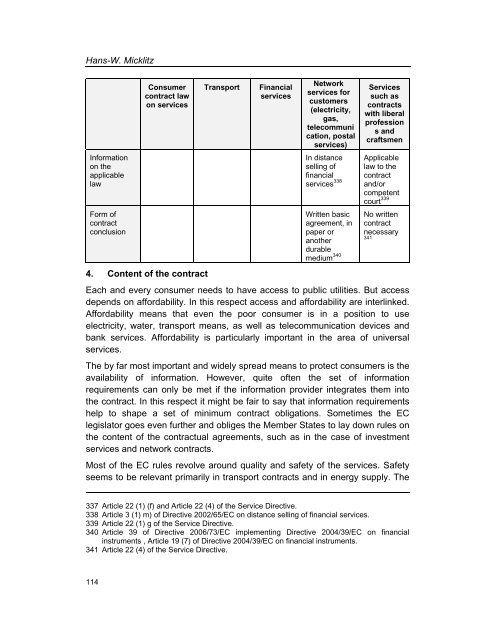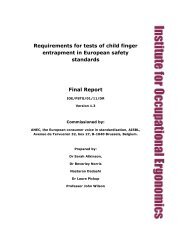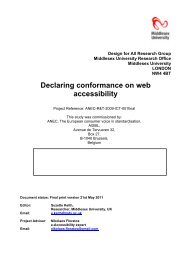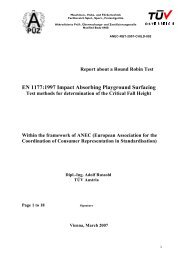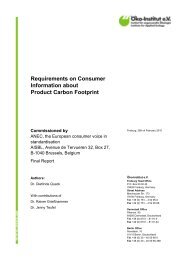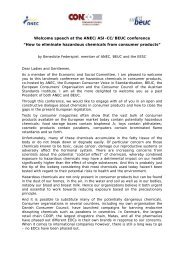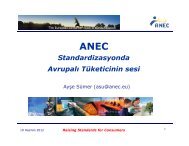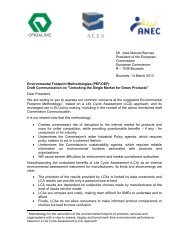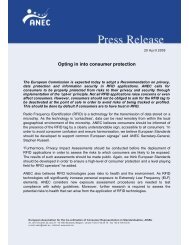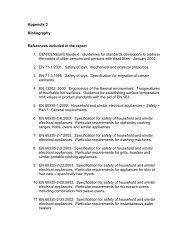Services Standards: Defining the Core Consumer Elements ... - ANEC
Services Standards: Defining the Core Consumer Elements ... - ANEC
Services Standards: Defining the Core Consumer Elements ... - ANEC
You also want an ePaper? Increase the reach of your titles
YUMPU automatically turns print PDFs into web optimized ePapers that Google loves.
Hans-W. Micklitz<br />
Information<br />
on <strong>the</strong><br />
applicable<br />
law<br />
Form of<br />
contract<br />
conclusion<br />
<strong>Consumer</strong><br />
contract law<br />
on services<br />
4. Content of <strong>the</strong> contract<br />
Transport<br />
Financial<br />
services<br />
Network<br />
services for<br />
customers<br />
(electricity,<br />
gas,<br />
telecommuni<br />
cation, postal<br />
services)<br />
In distance<br />
selling of<br />
financial<br />
services 338<br />
Written basic<br />
agreement, in<br />
paper or<br />
ano<strong>the</strong>r<br />
durable<br />
medium 340<br />
<strong>Services</strong><br />
such as<br />
contracts<br />
with liberal<br />
profession<br />
s and<br />
craftsmen<br />
Applicable<br />
law to <strong>the</strong><br />
contract<br />
and/or<br />
competent<br />
court 339<br />
No written<br />
contract<br />
necessary<br />
341<br />
Each and every consumer needs to have access to public utilities. But access<br />
depends on affordability. In this respect access and affordability are interlinked.<br />
Affordability means that even <strong>the</strong> poor consumer is in a position to use<br />
electricity, water, transport means, as well as telecommunication devices and<br />
bank services. Affordability is particularly important in <strong>the</strong> area of universal<br />
services.<br />
The by far most important and widely spread means to protect consumers is <strong>the</strong><br />
availability of information. However, quite often <strong>the</strong> set of information<br />
requirements can only be met if <strong>the</strong> information provider integrates <strong>the</strong>m into<br />
<strong>the</strong> contract. In this respect it might be fair to say that information requirements<br />
help to shape a set of minimum contract obligations. Sometimes <strong>the</strong> EC<br />
legislator goes even fur<strong>the</strong>r and obliges <strong>the</strong> Member States to lay down rules on<br />
<strong>the</strong> content of <strong>the</strong> contractual agreements, such as in <strong>the</strong> case of investment<br />
services and network contracts.<br />
Most of <strong>the</strong> EC rules revolve around quality and safety of <strong>the</strong> services. Safety<br />
seems to be relevant primarily in transport contracts and in energy supply. The<br />
337 Article 22 (1) (f) and Article 22 (4) of <strong>the</strong> Service Directive.<br />
338 Article 3 (1) m) of Directive 2002/65/EC on distance selling of financial services.<br />
339 Article 22 (1) g of <strong>the</strong> Service Directive.<br />
340 Article 39 of Directive 2006/73/EC implementing Directive 2004/39/EC on financial<br />
instruments , Article 19 (7) of Directive 2004/39/EC on financial instruments.<br />
341 Article 22 (4) of <strong>the</strong> Service Directive.<br />
114


